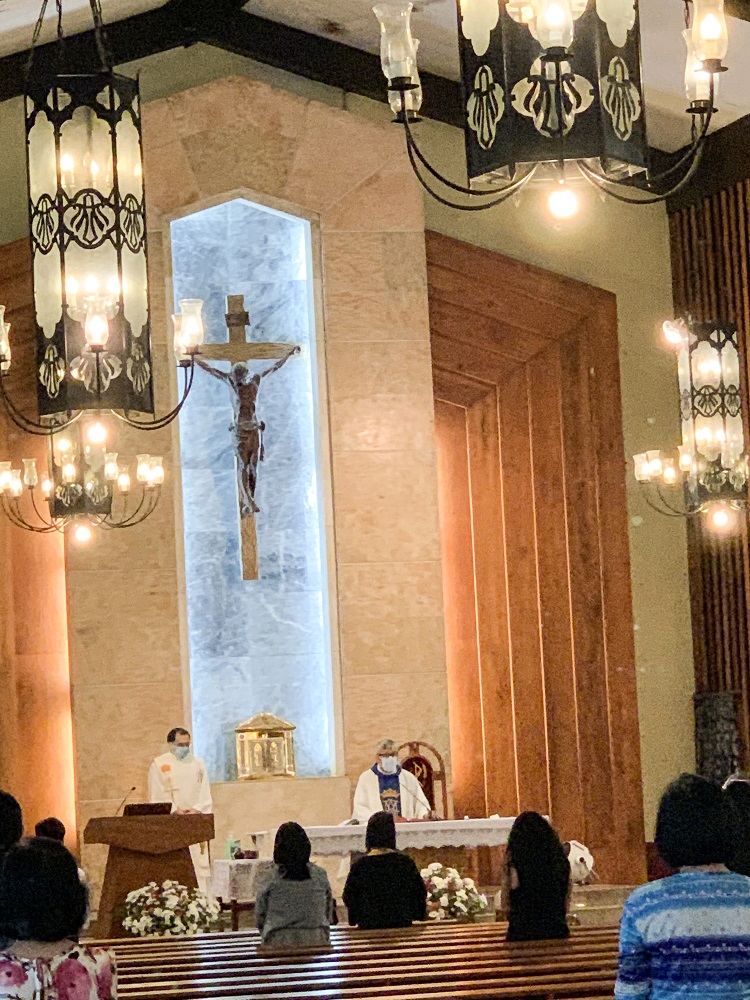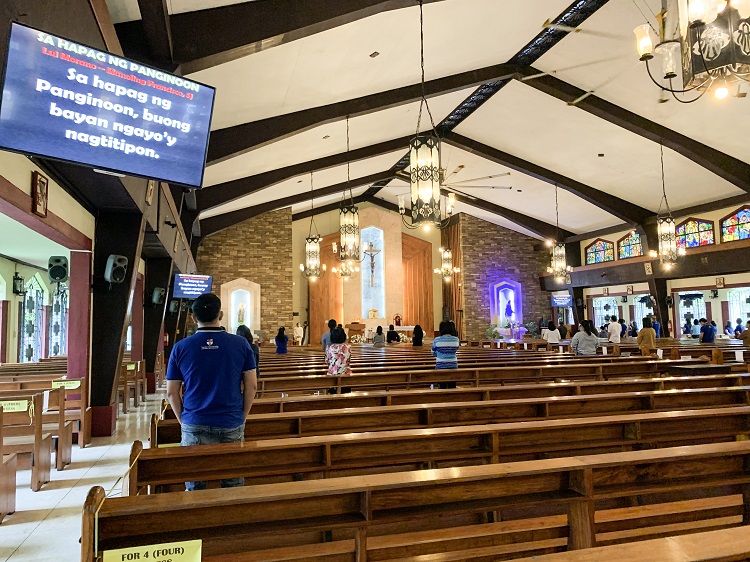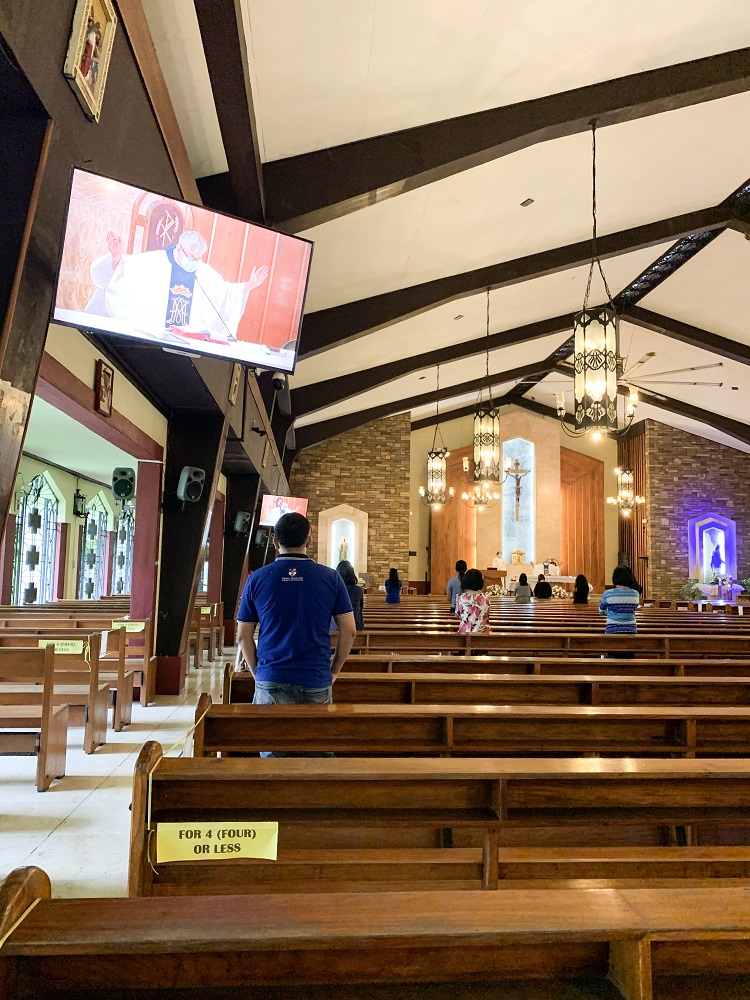
Oct 7, 2020 Feast of Our Lay of the Holy Rosary
Fr Gaby Gonzalez, S.J.
We celebrate this eucharist together this morning on the occasion of the university’s Formators and Teachers’ Day. It is therefore a thanksgiving, most of all, for the formators and teachers of the university. WE are thankful to the university’s formators and teachers for the dedication that they have shown in being mentors and guides to our students. We are thankful to our formators and teachers, for the perseverance and persistence that they invested in preparing themselves to become effective formators and teachers today. We are thankful to them for their strong-heartedness and determination when lack of resources, family concerns, workplace conflicts, and new, unexpected, circumstances like this covid 19 pandemic threatens the easy and efficient performance of their responsibilities. We are thankful for their sacrifices, the other more financial rewarding opportunities that they let go to continue teaching, for enduring the battle scars that dealing with difficult students have inflicted upon them, for giving from the little they receive to prop up a student or a colleague in times of crisis. We are thankful for the never tiring effort to ever improve their teaching through more study, consistent self-examination, and fearless readiness to face whatever situation a new day of teaching brings.

Each day for a teacher is like the moment of the annunciation to Mary. The announcement of the angel to Mary that she would be pregnant, and that she would be pregnant with the son of God in her womb, and that this would come to pass by some unknown manner involving the Holy Spirit, must have certainly caught Mary totally unprepared and just as surely unguarded. Anyone else would probably have said, “No” or “Wait, let me absorb that first.” And perhaps to a slight degree, Mary did try to postpone things a bit when she inquired how this would happen since she doesn’t know a man. And the angel says something involving the holy spirit which probably just went past her head. Despite the suddenness and the uncertainty of it all, however, Mary’s habitual disposition of openness leads her to say, not “no” or “wait first” but that most striking line when she says “I am the handmaid of the Lord. Let it be done to me as you have said.”
38 Dixit autem Maria: Ecce ancilla Domini: fiat mihi secundum verbum tuum.
It translates more directly to Filipino: Fiat = Mangyari; mihi=sa akin; secundum=ayon; verbum=sa salita; tuum=mo
If we try to parse these statements of Mary. We might say that there are two parts to it. The first is a declaration of who she sees herself to be. I am the handmaid of the Lord. Ecce Ancilla Domini. And because she clearly and thoroughly understands who she is, she then says let it be done to me just as you have said. Fiat mihi secundumen verbum tuum.
I say that the way this annunciation moment happened to Mary is very much like each day of teaching and ministering that happens to us teachers and formators. As we begin each day as teacher and formator, we never really know what’s going to meet us. We are lucky if it turns out to be a light, smooth day. But we know that it is more likely that there will be at least a couple of bumps as we go through the day. And we pray beneath our breath that it not be a heavy, rough day but we couple that prayer with the prayer to be strong enough for such a heavy, rough day if that is what should come. And sometimes, a day goes by quite in a light and smooth way and just as the day nears the end a sudden jolting bump happens.
But this is our everyday. We have developed a disposition akin to Mary’s habitual disposition of openness, to see in whatever comes in a day an announcement of the Lord, a call. And when the heavy and rough comes, when the bumps come, we, like Mary, first remember who we are – teacher, formator -- and remembering that, we say yes to the task at hand. We still do, sometimes at the expense of our own pride, our comfort, or our privilege, what we as teacher or formator must do for our students. We still say what we as teacher or formator we must say, even if it might not be received well.

The gift of a habitual open disposition to whatever God may call us to each day is the gift of spiritual freedom that we recognize as exemplified in Mary’s fiat during the annunciation, and it is a gift that the conditions and realities of our lives as teachers and formators have led us to, whether we were aware of it or not.
This gift of spiritual freedom, of habitual open disposition, is also the most important spiritual gift that we need at this time of the pandemic. The pandemic has shaken all of us. We are all very much hurting, very often we do this quietly, trying to keep a brave and strong front for the sake of our children and those who rely on us for strength. This experience of the pandemic feels like that it has disturbed the very ground that we had been so used to stand on.
The worst of it is that feeling of floating without anything to grasp on. Some have called it the experience of groundlessness. Some have described it as like trying to keep afloat in deep water with no life saver and with nothing to latch on to. Some describe it as a feeling as if the earth under our feet suddenly gave way and we are falling into an earth hole. It is a very uncomfortable, unsettling experience. And the more we try to hold on to things, to grasp at things tightly, the more we feel frustrated and angry and hurt.
Fr. Jordan Orbe, one of our psycho-spiritual experts in the province suggests three things to do in this situation: The first is to embrace the groundlessness. Embrace the groundlessness. Do not use up your emotional energy trying to fight it. The only way to conquer this groundlessness is not to do battle with it. So let it be, and take it as part of our reality now. The second is to consciously tell yourself and feel yourself in the here and now. The here is usually the home, the now is in these pandemic circumstances. Use your emotional energy for this instead: to befriend, to get used to, to be comfortable with the current situation. Discover whatever joys there are in this situation. Calmly figure out how to deal with the challenges and problems brought on by this situation. Do not try to keep holding on to sources of security we used to have. In other words, do not use up your emotional energy trying to go back to what was. Channel those energies to dealing with what is. And third, respond to the call of the here and now. Respond to the present moment. Whatever the here and now asks of you, give it. Whatever it requires of you, do it. And celebrate your little victories is responding to all these. Enjoy the sense of accomplishment and of moving forward finally as you do these tasks that are presenting themselves to you. And take these task just one at a time.
At the core of these three steps: Embracing the groundlessness, Focusing only on the here and now, and Responding to the tasks at hand, the spiritual grace we need the most is that of spiritual freedom, the freedom from our attachments, that habitual disposition of openness to answer whatever call comes to us. When we let go of the old sources of our securities and focus ourselves on the here and now, we will find God… in the here and now, in the present moment. We will find God and find him walking with us – perhaps more accurately, we will find him floating with us; and we will find him protecting us, carrying us through this very difficult situation. As we get in closer contact to God in the here and now, we will then find peace, we will find courage, we will find hope, we will find love. We will be like the sea where you may have on the surface strong winds, sea storms, and rough waves; but down below, deep within the sea are the constant currents that run and flow unceasingly and without disturbance. In those depths, we will find that peace and healing and even joy that we so long to have. +++